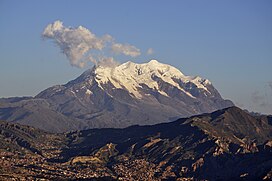| Illimani | |
|---|---|
 Illimani seen from La Paz, Bolivia Illimani seen from La Paz, Bolivia | |
| Highest point | |
| Elevation | 6,432 m (21,102 ft) |
| Prominence | 2,451 m (8,041 ft) |
| Listing | Ultra |
| Coordinates | 16°38′00″S 67°47′27″W / 16.63333°S 67.79083°W / -16.63333; -67.79083 |
| Geography | |
 | |
| Country | Bolivia |
| Department | La Paz Department |
| Parent range | Cordillera Real (Andes) |
| Climbing | |
| First ascent | 1898 by William Martin Conway, A. Maquignaz, and L. Pellissier |
Illimani (Aymara and Spanish pronunciation: [iʎiˈmani]) is the highest mountain in the Cordillera Real (part of the Cordillera Oriental, a subrange of the Andes) of western Bolivia. It lies near the cities of El Alto and La Paz at the eastern edge of the Altiplano. It is the second highest peak in Bolivia, after Nevado Sajama, and the eighteenth highest peak in South America. The snow line lies at about 4,570 metres (15,000 ft) above sea level, and glaciers are found on the northern face at 4,982 m (16,350 ft). The mountain has four main peaks; the highest is the south summit, Nevado Illimani, which is a popular ascent for mountain climbers.
Geologically, Illimani is composed primarily of granodiorite, intruded during the Cenozoic era into the sedimentary rock, which forms the bulk of the Cordillera Real.
Illimani is quite visible from the cities of El Alto and La Paz, and is their major landmark. The mountain has been the subject of many local songs, most importantly "Illimani", with the following refrain: "¡Illimani, Illimani, centinela tú eres de La Paz! ¡Illimani, Illimani, perla andina eres de Bolivia!" ("Illimani, Illimani, you are the sentinel of La Paz! Illimani, Illimani, you are Bolivia's andean pearl!")
Climbing

Illimani was first attempted in 1877 by the French explorator Charles Wiener, J. de Grumkow, and J. C. Ocampo. They failed to reach the main summit, but did reach a southeastern subsummit, on 19 May 1877, Wiener named it the "Pic de Paris", and left a French flag on top of it. In 1898, British climber William Martin Conway and two Italian guides, J.A. Maquignaz and L. Pellissier, made the first recorded ascent of the peak, again from the southeast. (They found a piece of Aymara rope at over 6,000 m (20,000 ft), so an earlier ascent cannot be completely discounted).
The current standard route on the mountain climbs the west ridge of the main summit. It was first climbed in 1940, by the Germans R. Boetcher, F. Fritz, and W. Kühn, and is graded French PD+/AD-. This route usually requires four days, the summit being reached in the morning of the third day.

In July 2010 German climber Florian Hill and long-time Bolivian resident Robert Rauch climbed a new route on the 'South Face', completing most of the 1700m of ascent in 21 hours. Deliver Me (WI 6 and M6+) appears to climb the gable-end of the South West Ridge, a very steep wall threatened by large broken seracs.
Incidents
In 1973 Pierre Dedieu, French, and Ernesto Sánchez, Bolivia's best climber, perished climbing Illimani in August. In November an Italian expedition after ascending Illimani undertook the search for their bodies, locating the body of Sánchez, but on the 23rd of that month, during extended search for Dedieu, the Italian leader Carlo Nembrini fell to his death.
Illimani was the site where Eastern Air Lines Flight 980 crashed on January 1, 1985.
US Major Kenneth R. Miller, US Colonel Paul Bruce Kappelman, and Bolivian guide Vincente Perez died in a climbing accident on June 7, 2003.
A German climber died on May 2, 2017, due to an avalanche occurring during the evening as he and his guide were climbing. The guide survived with minor injuries.
American climber Daniel Granberg died on the summit of Illimani in September 2021. His body was recovered after a two-day effort.
See also
Notes
- This is sometimes given as 6,462 m, but topographic map sources, including a very accurate map by the German Alpine Club, agree that it is 6,438 m. This figure comes from a differential GPS survey; see the reference to World Mountaineering.
- ^ "Bolivian ultra-prominent peaks". peaklist.org. Retrieved 2007-04-13.
- "The 6000m peaks of the Andes". andes.org.uk. Retrieved 2007-04-13.
- Yossi Brain, Bolivia: a climbing guide, The Mountaineers, 1999, ISBN 0-89886-495-X. Some sources claim that Illimani is an extinct stratovolcano, but this is not correct. In fact none of the peaks of the Cordillera Real are volcanic; see Tom Simkin and Lee Siebert, Volcanoes of the World, a regional directory... (second edition), Smithsonian Institution/Geoscience Press, 1994, ISBN 0-945005-12-1.
- René, Verneau (18 May 2018). "Charles Wiener". Journal de la société des américanistes. 11 (1).
- ^ Lindsay Griffin (1998). "Illimani". In Audrey Salkeld (ed.). World Mountaineering. Bulfinch Press. pp. 254–257. ISBN 0-8212-2502-2.
- "bolivie 2010". pioletsdor.com. Archived from the original on 2016-01-26. Retrieved 2015-11-01.
- "South America, Bolivia, Illampu and Illimani". americanalpineclub.org. Retrieved 2018-05-24.
- "Army major from here dies climbing Andes". Retrieved 2018-03-03.
- "Deutscher Bergsteiger stirbt in den bolivianischen Anden". www.rp-online.de. Retrieved 2017-08-20.
- "Body of climber from Colorado recovered from Bolivian peak". www.apnews.com. Associated Press. Retrieved 2021-09-06.
External links

- "Illimani". Peakware.com. Archived from the original on 2016-03-04.
